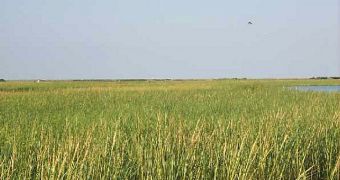Officials at the US National Science Foundation (NSF) announce that they have just awarded a rapid response grant to researchers at the Louisiana State University (LSU), for conducting a study on the effects of the BP oil spill on salt marshes in Louisiana.
These are extremely sensitive ecosystems, and even the smallest disturbances can throw them off-balance. This is precisely why the new grant was awarded, the NSF team explains.
The goal of the investigation is to determine the extent of the influence oil emanating from the BP spill site has on these delicate ecosystems.
The Deepwater Horizon semi-submersible drilling rig, which was operated in the Gulf of Mexico by British Petroleum, exploded on April 20, and then sunk on April 22.
The accident gave birth to one of the most massive oil spills ever, and to the worst ecological disaster in the history of the United States.
Oil sheens at some points threaten to enter the Loop Current, and then the Gulf Stream, and to contaminate the entire east coast of the US.
It was only through the efforts and dedication of emergency response crews that the situation was kept under control to some extent, and the overall damage was limited.
But now, even with the leak plugged, a large threat remains. Massive amounts of oil still lurk in the Gulf, either on the surface or in underwater plumes.
Either of these plumes could make their way to coastal Louisiana salt marshes, with potentially devastating effects. The LSU team is in charge of determining what will happen exactly in such a scenario.
“Data are being collected that may be used as indicators of the long-term health of the salt marsh community. From these data, we will obtain information that precedes potentially far-reaching changes,” explains LSU expert Eugene Turner.
“This exceptionally large oil spill and subsequent remediation efforts are landmark opportunities to learn about short- and long-term stressors on salt marsh ecosystems,” he adds.
There are numerous stress factors that affect marshlands, and oil plumes exhibit a two-folded threat.
“They also have indirect effects because, as oil and dispersants begin to degrade, they enter food webs via primary consumers such as suspension-feeding oysters, deposit-feeding bivalves, and grazing gastropods,” explains scientist David Garrison.
He is based at the NSF Division of Ocean Sciences, the agency that provides the funds for the new investigation.

 14 DAY TRIAL //
14 DAY TRIAL //